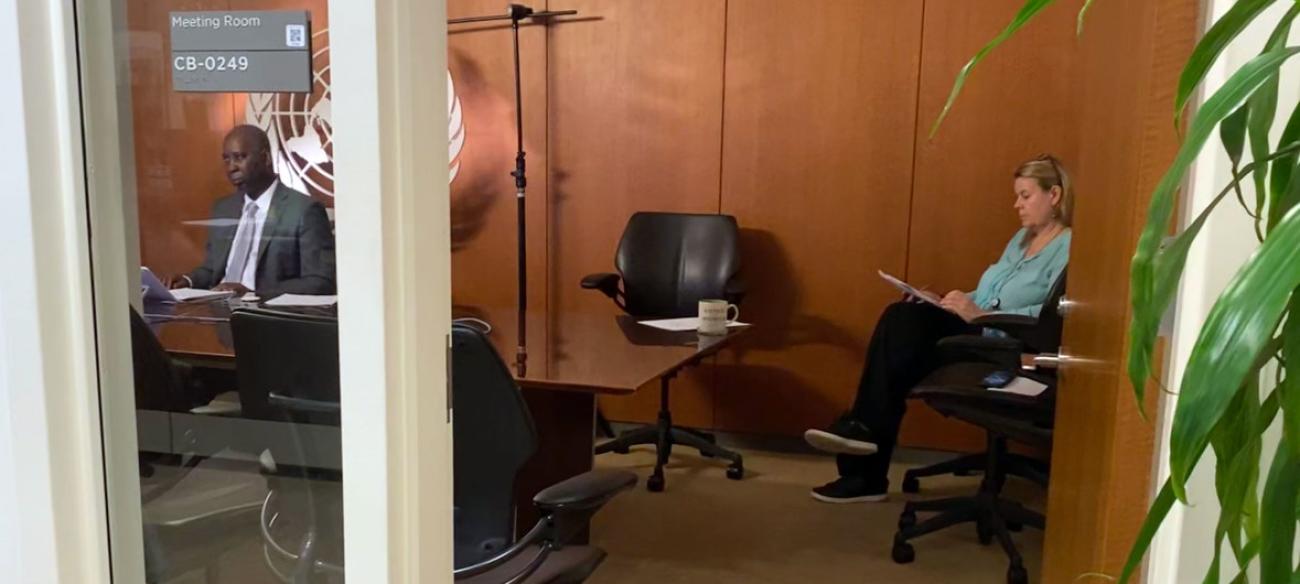UN General Assembly President Tijjani Muhammad-Bande (left) and his Chef de Cabinet, Ambassador Mari Skåre, during the historic virtual joint briefing to Member States by the heads of four UN principal organs, held on 27 March 2020.
Although it seems the whole world is on lockdown as countries follow health guidelines to curb the spread of COVID-19, the global “town hall” at UN Headquarters in New York remains open for business, albeit with a technical twist.
That’s the message from Ambassador Mari Skåre, Chef de Cabinet to the President of the UN General Assembly, speaking about how the pandemic has changed working procedures at the world’s most representative body.
“When we understood that this was becoming a public health issue here (in New York City) …we reacted quite swiftly and started to postpone in-person or physical meetings”, the Norwegian diplomat told UN News this week.
“The General Assembly is the most representative forum in the world, where all Member States come and deliberate – it’s like the town hall of the world – so we wanted to ensure that those deliberations could continue. And the chosen means would be either in writing, but also through virtual meetings”.
Ambassadors normally gather in the iconic General Assembly Hall, just off Manhattan’s First Avenue, for meetings on issues related to development, peace, security or other matters covered by the UN Charter. They also vote on resolutions and decisions, with the results posted on huge screens in the chamber.
Now that social distancing is part of everyone’s current reality, several meetings have had to be postponed or cancelled, such as the annual commemoration on 7 April of the International Day of Reflection on the 1994 Genocide Against the Tutsi in Rwanda.
The General Assembly, however, is still taking action on resolutions and decisions amid the pandemic.
Ms. Skåre said as the situation progressed, countries took “a leap of faith” and for the first time authorized what she described as a “temporary and very extraordinary procedure”.
The General Assembly President, Tijjani Muhammad-Bande, now circulates draft resolutions to Member States under what is known as a “silence procedure”. Ambassadors have a 72-hour deadline, giving them time to consult with their capitals, if necessary, before stating their national opinions.
A resolution is adopted provided there are no objections, and the President will circulate a letter confirming the adoption. However, it is scuppered if even one country objects and the President will inform Ambassadors that the “silence” has been broken.
Ms. Skåre explained that under normal conditions, the General Assembly would vote on a resolution if a Member State calls for it. Currently, this is technically impossible.
“We do not have any voting procedures in place under such an extraordinary regime”, she said, adding that “we are exploring, and we will discuss with Member States and consult because there could be different views on whether that will be necessary or not”.
Since silence procedure came into effect, the General Assembly has adopted several resolutions, including on the financing of the UN-African Union Hybrid Operation in Darfur (UNAMID), and on COVID-19.
That resolution followed a meeting on the pandemic, where the General Assembly President and the heads of three other UN principal organs held a joint virtual briefing for all Member States.
Speaking on behalf of the global Secretariat, UN Secretary-General António Guterres assured Ambassadors that “our critical work is continuing largely uninterrupted”.
Ms. Skåre and staff in the Office of the General Assembly President have also not seen any slowdown. With all colleagues working from home, cabinet meetings are held online, for example, although she comes to Headquarters roughly once a week because it is easier to work there.


















